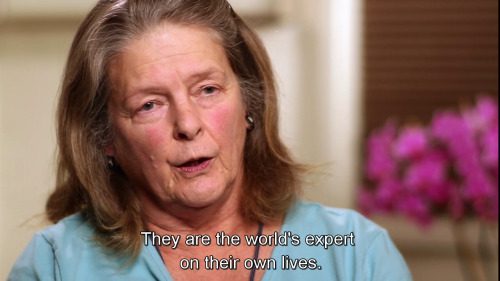From Cosmos: A Spacetime Oddyssey, Episode 4 - A Sky Full Of Ghosts

From Cosmos: A Spacetime Oddyssey, Episode 4 - A Sky Full of Ghosts
More Posts from Theidlerhour and Others
What is human existence? It turns out it’s pretty simple: We are dead stars, looking back up at the sky.
Dr. Michelle Thaller, NASA astronomer (via psych-facts)




Happy Back to the Future Day! We’re kind of obsessed with the future predictions found on these old cigarette cards from our Digital Collections. Imagine London being lit by a gigantic laser light contraption? Amazing.
See more here.
"To paraphrase Walt Whitman: 'You are vast. You contain multitudes. Now let them live.'"
Imagine a droplet sitting on a rigid surface spontaneously bouncing up and then continuing to bounce higher after each impact, as if it were on a trampoline. It sounds impossible, but it’s not. There are two key features to making such a trampolining droplet–one is a superhydrophobic surface covered in an array of tiny micropillars and the other is very low air pressure. The low-pressure, low-humidity air around the droplet causes it to vaporize. Inside the micropillar array, this vapor can get trapped by viscosity instead of draining away. The result is an overpressurization beneath the droplet that, if it overcomes the drop’s adhesion, will cause it to leap upward. For more, check out the original research paper or the coverage at Chemistry World. (Video credit and submission: T. Schutzius et al.)



Check out these scientists reacting to the first images from the Hubble Space Telescope after they successfully fixed its wonky mirror.
Then watch our music video celebrating Hubble here.
Then read all about Hubble’s 25 years in space here.

Mt. Fuji and Sekiyadojo castle at dusk, Chiba, Japan via GANREF
Is it possible to have a spacesuit that is skin tight? My logic on this is that space wants to separate your bodies atoms but can the pressure be neutralized by having a tight enough skin suit? Am I even making sense?
Meet Dava Newman:


Now NASA’s Deputy Administrator (second-in-command). She’s spent years at MIT developing what’s known as the “BioSuit” - basically a skintight spacesuit that would use mechanical counter-pressure to apply about a third of an atmosphere on the body, enabling exploration with full range of motion, minimizing the energy spent fighting your own bubble-boy-of-a-suit.
There were a couple of problems remaining when she left to work for NASA:
The design so far still includes a pressurized helmet that has a seal issue with the rest of the suit. Also certain parts of the suit (the hands as you can see above) are difficult to get quite right.
The second problem is going to be returned to in a few years. The last I heard the research group was going to let material science develop carbon nanotubes and graphene a bit more and then try using those two materials somehow in the design.
It’s a super promising design and I hope they get it down pat! As is, it stands to benefit the medical community as well as to open astronaut qualifications to people shorter than 5′5″ (or somewhere around there) - below which apparently they can’t even apply to be an astronaut due to the spacesuits not being made small enough.
(Image credit: Professor Dava Newman: Inventor, Science Engineering; Guillermo Trotti, A.I.A., Trotti and Associates, Inc. (Cambridge, MA): Design; Dainese (Vincenca, Italy): Fabrication; Douglas Sonders: Photography)
things i like doing: math
things i hate doing: math

Global temperatures are running far above last year’s record-setting level, all but guaranteeing that 2015 will be the hottest year in the historical record — and undermining political claims that global warming had somehow stopped.
The National Oceanic and Atmospheric Administration, the American agency that tracks worldwide temperatures, announced Wednesday that last month had been the hottest September on record, and in fact took the biggest leap above the previous September that any month has displayed since 1880, when tracking began at a global scale. The agency also announced that the January-to-September period had been the hottest such span on the books.
The extreme heat and related climate disturbances mean that delegates to a global climate conference scheduled for Paris in early December will almost certainly be convening as weather-related disasters are unfolding around the world, putting them under greater political pressure to reach an ambitious deal to limit future emissions and slow the temperature increase.
The immediate cause of the record-breaking warmth is a strong El Niño weather pattern, in which the ocean releases immense amounts of heat into the atmosphere. But temperatures are running so far ahead of those during the last strong El Niño, in 1997 and 1998, that scientists said the records would not be occurring without an underlying trend caused by human emissions of greenhouse gases.
“The bottom line is that the world is warming,” said Jessica Blunden, a climate scientist with NOAA, in Asheville, N.C. Source: NYTimes
-
 lefthoundneckturtle-blog liked this · 6 years ago
lefthoundneckturtle-blog liked this · 6 years ago -
 abrownbossbitch liked this · 6 years ago
abrownbossbitch liked this · 6 years ago -
 ethniceve-blog liked this · 6 years ago
ethniceve-blog liked this · 6 years ago -
 jstlkheaven reblogged this · 6 years ago
jstlkheaven reblogged this · 6 years ago -
 eirlyss reblogged this · 7 years ago
eirlyss reblogged this · 7 years ago -
 intertransverso liked this · 7 years ago
intertransverso liked this · 7 years ago -
 burakusutaru liked this · 7 years ago
burakusutaru liked this · 7 years ago -
 potterscloak reblogged this · 7 years ago
potterscloak reblogged this · 7 years ago -
 aemnb reblogged this · 7 years ago
aemnb reblogged this · 7 years ago -
 aemnb liked this · 7 years ago
aemnb liked this · 7 years ago -
 logner0109 liked this · 7 years ago
logner0109 liked this · 7 years ago -
 pastdust liked this · 8 years ago
pastdust liked this · 8 years ago -
 grabbelton reblogged this · 8 years ago
grabbelton reblogged this · 8 years ago -
 longforgotteneulogies liked this · 8 years ago
longforgotteneulogies liked this · 8 years ago -
 punkprefect liked this · 8 years ago
punkprefect liked this · 8 years ago -
 faithfulinmyself reblogged this · 8 years ago
faithfulinmyself reblogged this · 8 years ago -
 faithfulinmyself liked this · 8 years ago
faithfulinmyself liked this · 8 years ago -
 notgonnausemyrealname liked this · 8 years ago
notgonnausemyrealname liked this · 8 years ago -
 crazyshitithinkabout reblogged this · 8 years ago
crazyshitithinkabout reblogged this · 8 years ago -
 tjboston1 reblogged this · 8 years ago
tjboston1 reblogged this · 8 years ago -
 cynthsr liked this · 8 years ago
cynthsr liked this · 8 years ago -
 studilierkim reblogged this · 9 years ago
studilierkim reblogged this · 9 years ago -
 versat1l3 liked this · 9 years ago
versat1l3 liked this · 9 years ago -
 casomxela-blog liked this · 9 years ago
casomxela-blog liked this · 9 years ago -
 trekkiejanewaymurdock liked this · 9 years ago
trekkiejanewaymurdock liked this · 9 years ago -
 danielledreamsthedayaway liked this · 9 years ago
danielledreamsthedayaway liked this · 9 years ago -
 dirvysmalestrom liked this · 9 years ago
dirvysmalestrom liked this · 9 years ago -
 necrosarcophagus-blog reblogged this · 9 years ago
necrosarcophagus-blog reblogged this · 9 years ago -
 necrosarcophagus-blog liked this · 9 years ago
necrosarcophagus-blog liked this · 9 years ago -
 moregooddays liked this · 9 years ago
moregooddays liked this · 9 years ago -
 nuclearredneck reblogged this · 9 years ago
nuclearredneck reblogged this · 9 years ago -
 starchildchampion-blog reblogged this · 9 years ago
starchildchampion-blog reblogged this · 9 years ago -
 starchildchampion-blog liked this · 9 years ago
starchildchampion-blog liked this · 9 years ago -
 everyday-im-hufflepuffing liked this · 9 years ago
everyday-im-hufflepuffing liked this · 9 years ago -
 didmyclothesjustdisappear liked this · 9 years ago
didmyclothesjustdisappear liked this · 9 years ago -
 sequard liked this · 9 years ago
sequard liked this · 9 years ago -
 quizilla2009 liked this · 9 years ago
quizilla2009 liked this · 9 years ago -
 smangie789 reblogged this · 9 years ago
smangie789 reblogged this · 9 years ago -
 smangie789 liked this · 9 years ago
smangie789 liked this · 9 years ago -
 kikistakeoutservice liked this · 9 years ago
kikistakeoutservice liked this · 9 years ago
"To awaken my spirit through hard work and dedicate my life to knowledge... What do you seek?"
229 posts








